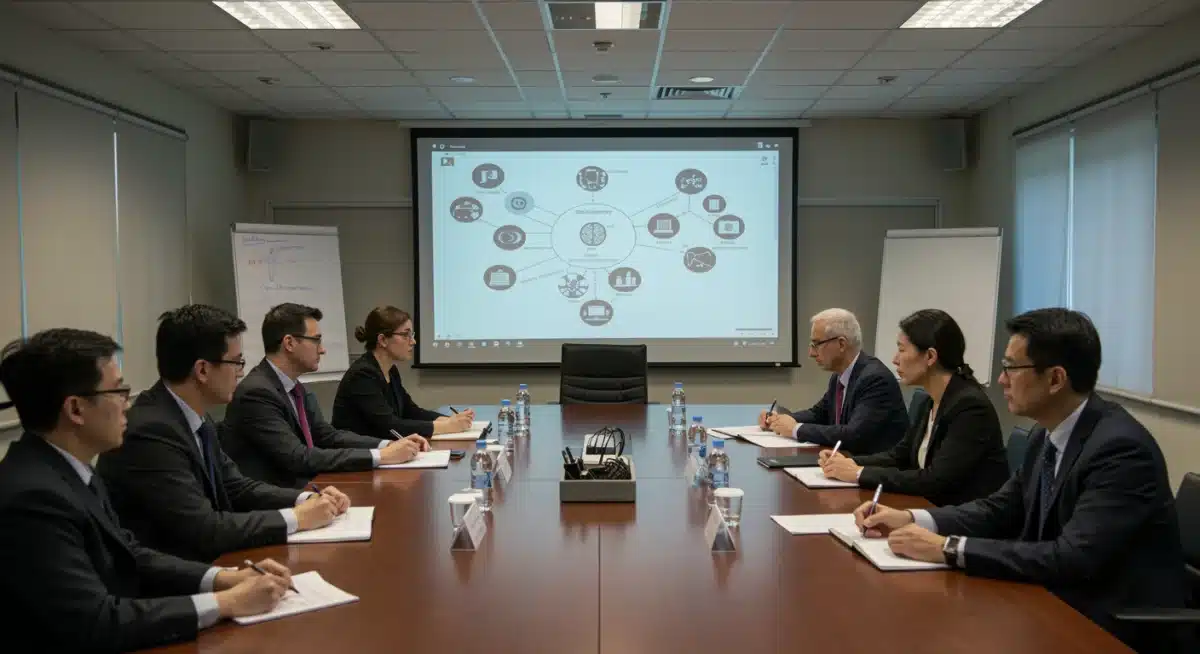Brain-Computer Interfaces: Ethical & Regulatory Challenges 2025 US

The rapid advancement of Brain-Computer Interfaces (BCI) in the US presents significant ethical and regulatory hurdles for 2025, requiring proactive governance to ensure responsible innovation and protect individual rights.
As we approach 2025, the burgeoning field of Brain-Computer Interfaces: Ethical and Regulatory Challenges for 2025 Innovation in the US is rapidly pushing the boundaries of what’s possible, promising revolutionary advancements in healthcare, communication, and even human augmentation. However, this transformative technology also brings with it a complex web of ethical dilemmas and regulatory gaps that demand immediate attention.
The Accelerating Pace of BCI Development
The landscape of Brain-Computer Interface (BCI) technology is evolving at an unprecedented rate, with significant breakthroughs reported almost weekly. From restoring motor function to paralyzed individuals to enabling direct communication for those with severe disabilities, BCIs are moving from speculative science fiction to tangible reality. This acceleration is largely driven by increased investment in neurotechnology research and development across the United States.
Recent advancements highlight miniaturization, enhanced signal processing, and improved non-invasive methods, making BCIs more accessible and powerful. Companies and academic institutions are now focusing on integrating these devices into everyday life, not just clinical settings. This shift necessitates a critical examination of the societal implications and the need for robust oversight.
Key Technological Leap Forwards
- Non-invasive BCIs: Improvements in EEG and fNIRS technologies are enabling more precise brain signal capture without surgical implantation, broadening potential user bases.
- Advanced Algorithms: Machine learning and AI are crucial for interpreting complex brain data, leading to more responsive and intuitive BCI systems.
- Miniaturization: Devices are becoming smaller and more discreet, facilitating easier integration and reducing the stigma often associated with medical devices.
Privacy and Data Security Concerns
The very nature of Brain-Computer Interfaces involves direct interaction with the human brain, generating vast amounts of highly sensitive neural data. This data, which could potentially reveal thoughts, intentions, and even emotional states, raises profound privacy and data security concerns. The absence of specific legislation tailored to neurodata creates a significant vulnerability.
Current data protection frameworks, such as HIPAA for health information, may not fully encompass the unique characteristics and implications of brain activity data. The potential for misuse, unauthorized access, or commercial exploitation of such intimate personal information is a looming threat that requires urgent regulatory attention. As BCI adoption grows, so does the imperative to shield this neural data effectively.
Protecting Neural Information
- Unique Data Sensitivity: Brain data is fundamentally different from other forms of personal data, offering insights into an individual’s core identity.
- Potential for Misuse: Without strong protections, neural data could be used for targeted advertising, discrimination, or even coercive applications.
- Regulatory Lag: Existing laws struggle to keep pace with the rapid advancements in BCI technology, leaving critical gaps in data governance.
Defining Neuro-Rights and Human Autonomy
As BCIs become more sophisticated, questions surrounding neuro-rights and the preservation of human autonomy are moving to the forefront of ethical discussions. If a device can interpret or even influence brain activity, what protections are needed to ensure an individual’s mental privacy and freedom of thought? These are not hypothetical questions but immediate challenges for 2025 and beyond.
The concept of cognitive liberty—the right to control one’s own mental processes—is gaining traction among ethicists and legal scholars. Ensuring that individuals retain full control over their mental states and neural data, free from external manipulation or surveillance, is paramount. This requires proactive legal frameworks that anticipate future BCI capabilities rather than reacting to them after the fact.
Core Neuro-Rights Considerations
- Mental Privacy: The right to protect one’s thoughts and mental data from unauthorized access or disclosure.
- Cognitive Liberty: The right to make free and informed decisions about one’s own mental processes, free from external interference.
- Psychological Continuity: Ensuring that BCI use does not fundamentally alter an individual’s sense of self or identity without their explicit, informed consent.
Regulatory Frameworks and Oversight Gaps
The current regulatory landscape in the United States is ill-equipped to handle the complexities introduced by Brain-Computer Interfaces. Existing bodies like the FDA primarily focus on device safety and efficacy, but the ethical and societal implications of BCIs extend far beyond traditional medical device regulation. There is a pressing need for a comprehensive, multi-agency approach to oversight.
As of now, there isn’t a dedicated federal agency or cross-agency task force specifically designed to address the unique ethical, legal, and social issues (ELSI) posed by neurotechnology. This fragmented regulatory environment creates uncertainty for innovators and potential risks for users. The challenge for 2025 is to develop adaptable frameworks that can evolve with the technology.

Addressing Regulatory Shortcomings
- FDA’s Role: While critical for safety, the FDA’s mandate does not fully cover the broader ethical and societal impacts of BCIs.
- Inter-agency Collaboration: A coordinated effort involving agencies like the FDA, FTC, and civil liberties organizations is essential.
- Proactive Legislation: Laws are needed that specifically address neurodata privacy, cognitive liberty, and responsible BCI development.
Equity, Accessibility, and Digital Divide
The rapid development of advanced Brain-Computer Interfaces also raises critical questions about equity and accessibility. As with many cutting-edge technologies, there is a risk that BCIs could exacerbate existing societal inequalities, creating a new form of digital divide. If these transformative tools are only available to a select few, it could lead to significant disparities in health, capability, and quality of life.
Ensuring equitable access to BCIs, particularly those with therapeutic benefits, will be a major challenge. Beyond financial cost, factors such as geographical location, technological literacy, and insurance coverage will play a crucial role. Policymakers must consider these aspects proactively to prevent a future where advanced neuro-enhancements are a luxury rather than a widely available benefit.
Ensuring Fair Access to BCI Technology
- Cost Barriers: High development and production costs often translate to expensive end-user devices, limiting access.
- Geographic Disparities: Access to specialized BCI clinics and expertise may be concentrated in urban centers.
- Insurance Coverage: Lack of clear medical device classifications or coverage policies can prevent widespread adoption for those who need it most.
The Path Forward: Collaboration and Ethical Innovation
Addressing the complex ethical and regulatory challenges posed by Brain-Computer Interfaces: Ethical and Regulatory Challenges for 2025 Innovation in the US requires a concerted, multidisciplinary effort. This involves not only lawmakers and regulatory bodies but also technologists, ethicists, legal experts, and the public. Open dialogue and collaborative initiatives are essential to shape a future where BCI technology serves humanity responsibly.
Innovation should not outpace ethical reflection. Establishing clear guidelines and best practices for BCI development, alongside robust regulatory frameworks, will foster public trust and ensure that these powerful tools are used for the greater good. The next few years are critical in laying this foundation, as decisions made now will profoundly impact the future of neurotechnology and society.
Strategies for Responsible BCI Development
- Multi-stakeholder Dialogues: Bringing together diverse groups to discuss and agree upon ethical principles and regulatory needs.
- Adaptive Regulation: Creating flexible frameworks that can adjust to rapid technological changes without stifling innovation.
- Public Education: Informing the public about BCI capabilities, risks, and ethical considerations to foster informed societal engagement.
| Key Point | Brief Description |
|---|---|
| Data Privacy | BCIs generate highly sensitive neural data requiring specific legal protections beyond current frameworks. |
| Neuro-Rights | Defining and protecting mental privacy and cognitive liberty is crucial as BCI capabilities advance. |
| Regulatory Gaps | Existing US regulations are insufficient for the unique ethical and societal challenges of BCIs. |
| Equity & Access | Ensuring fair and widespread access to BCI technology to avoid exacerbating societal inequalities. |
Frequently Asked Questions About BCI Ethics and Regulation
Primary ethical concerns include mental privacy (access to thoughts), cognitive liberty (freedom of thought), potential for manipulation, and the impact on personal identity. These issues demand careful consideration as BCI technology becomes more advanced and integrated into daily life, especially in the US for 2025.
Currently, BCI data lacks specific, comprehensive regulation. While some health-related data might fall under HIPAA, neural data’s unique sensitivity often isn’t fully addressed. This regulatory gap creates vulnerabilities for user privacy and necessitates new, tailored legal frameworks for 2025 innovation.
Neuro-rights are emerging human rights designed to protect the brain and its activity from technological interference. They include rights to mental privacy, cognitive liberty, and protection from algorithmic bias or manipulation. These are crucial for safeguarding individuals in a future with widespread BCI use.
There is a significant risk that advanced BCI technology could widen social inequalities if access is limited by cost, geography, or other factors. Ensuring equitable access and affordability for therapeutic and potentially enhancing BCIs is a critical challenge for policymakers and innovators in the coming years.
Efforts include increased dialogue among ethicists, technologists, and policymakers, calls for new legislation, and the development of ethical guidelines by research institutions. The aim is to create proactive, adaptive regulatory frameworks that balance innovation with robust protections for individuals as BCI technology advances rapidly.
Looking Ahead
The rapid evolution of Brain-Computer Interfaces in the US demands immediate and sustained attention to its ethical and regulatory dimensions. The coming years, leading up to and beyond 2025, will be pivotal in shaping how society integrates these powerful technologies. Stakeholders must prioritize the development of robust legal frameworks and ethical guidelines to safeguard individual rights and ensure equitable access. Continued vigilance and proactive collaboration are essential to navigate this complex landscape, ensuring that BCI innovation serves humanity responsibly and inclusively. The decisions made today will set the precedent for future neurotechnological advancements.





